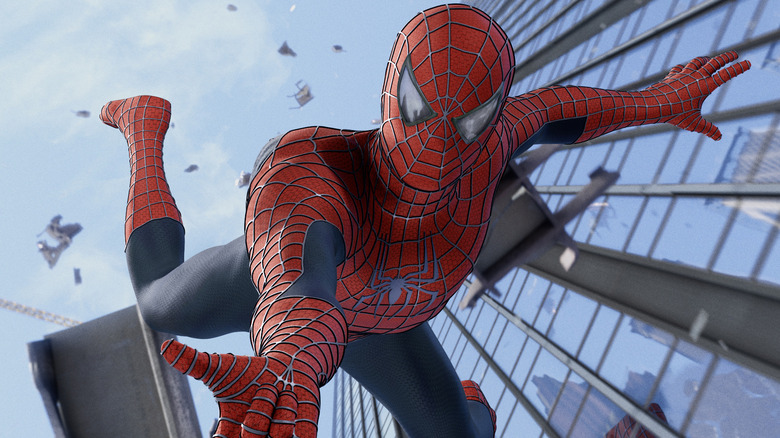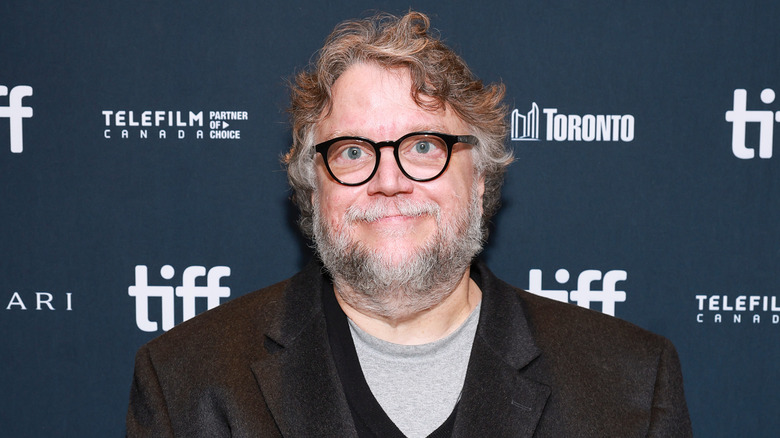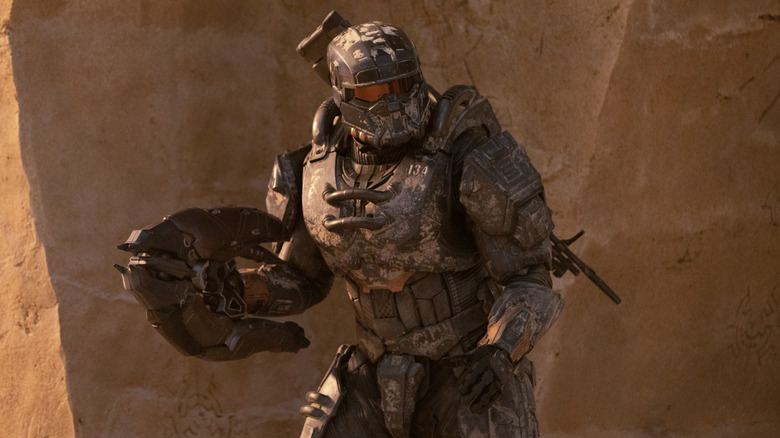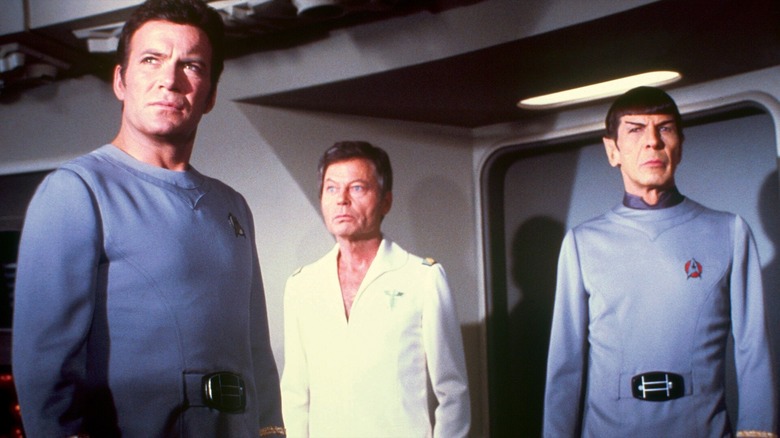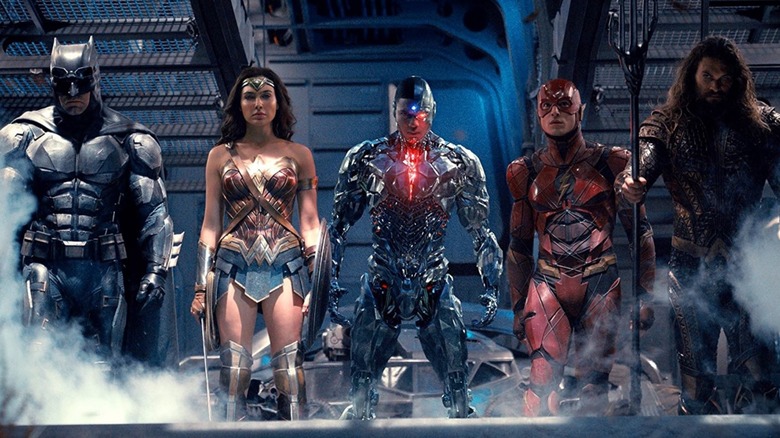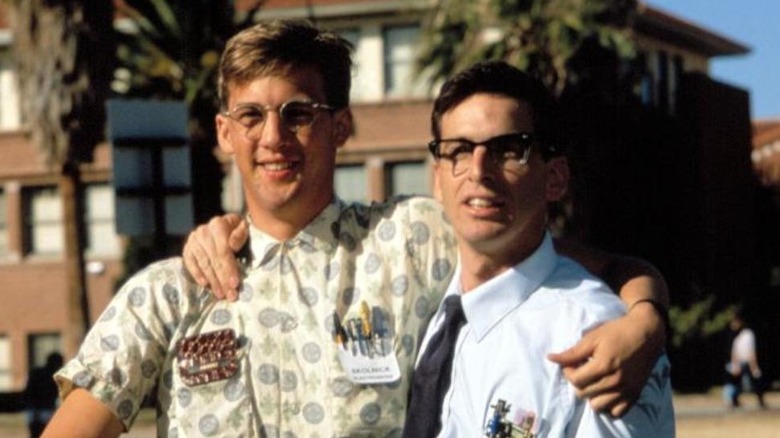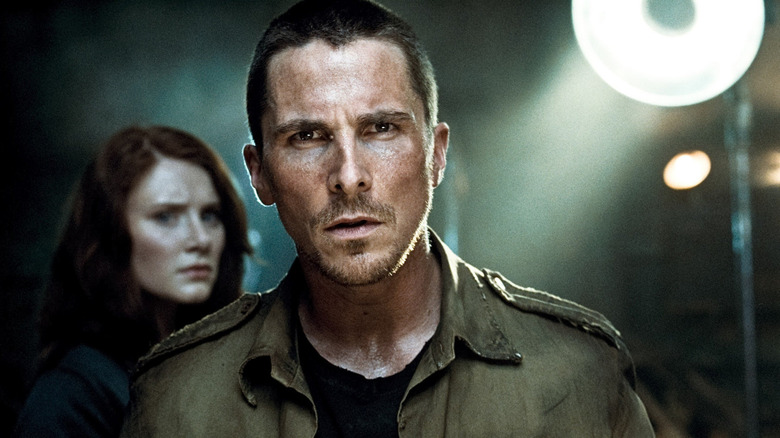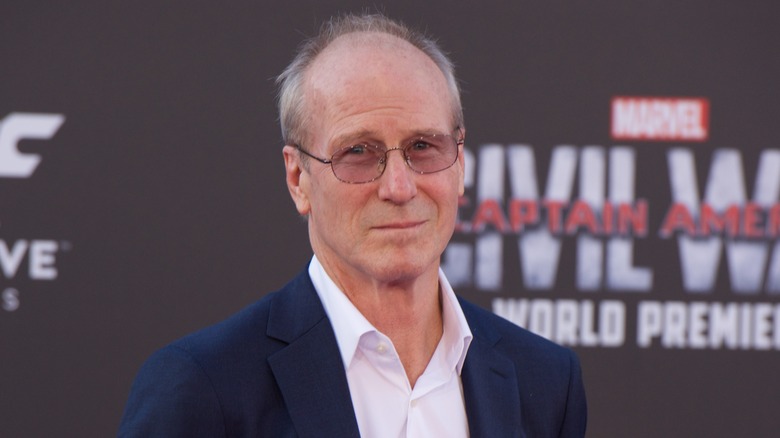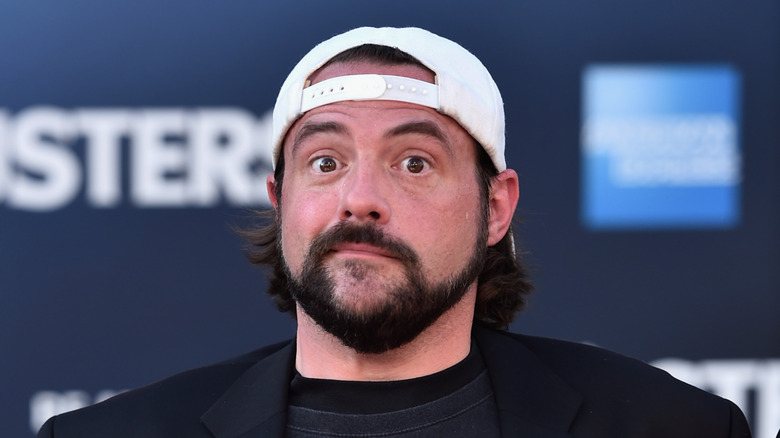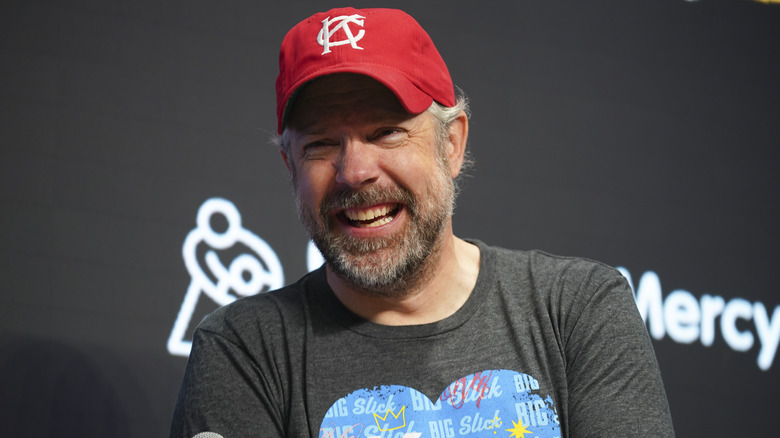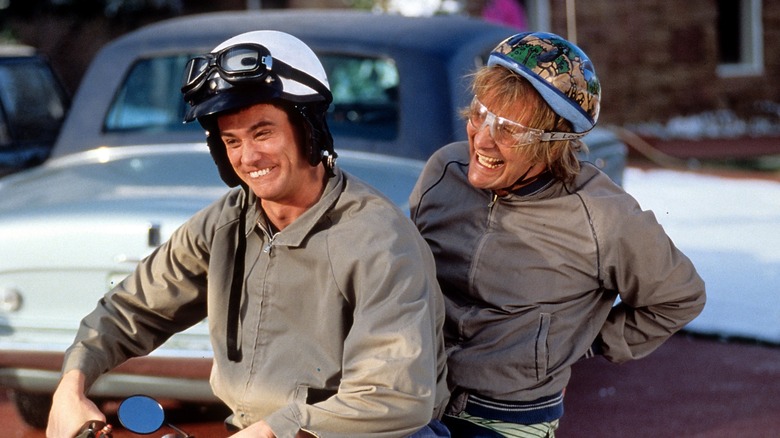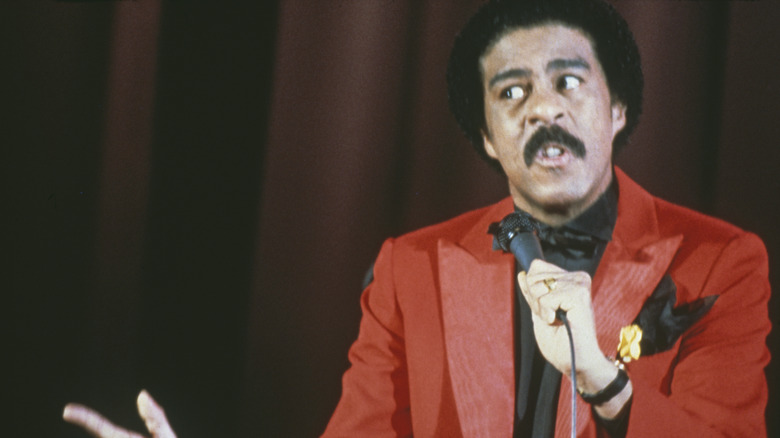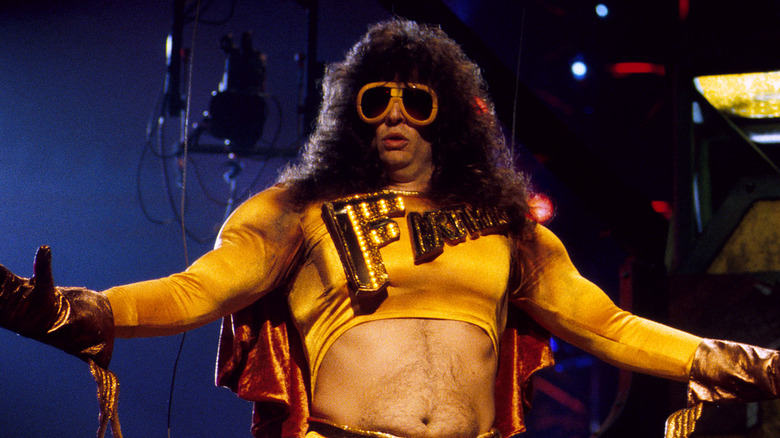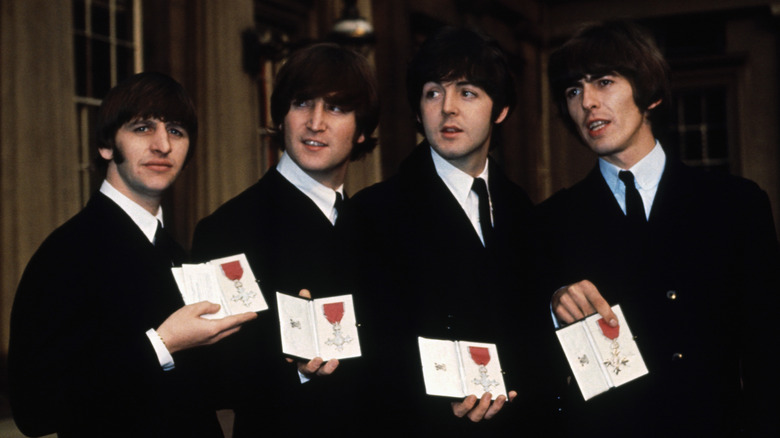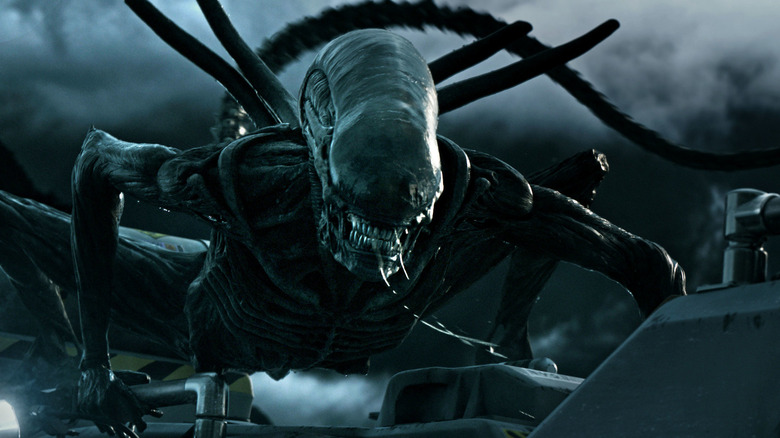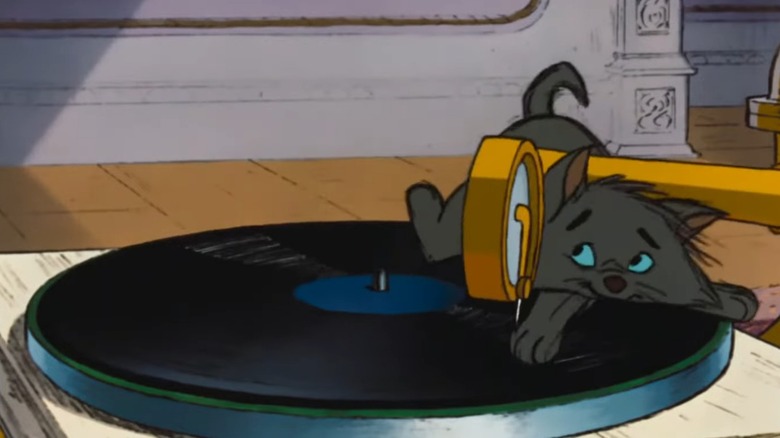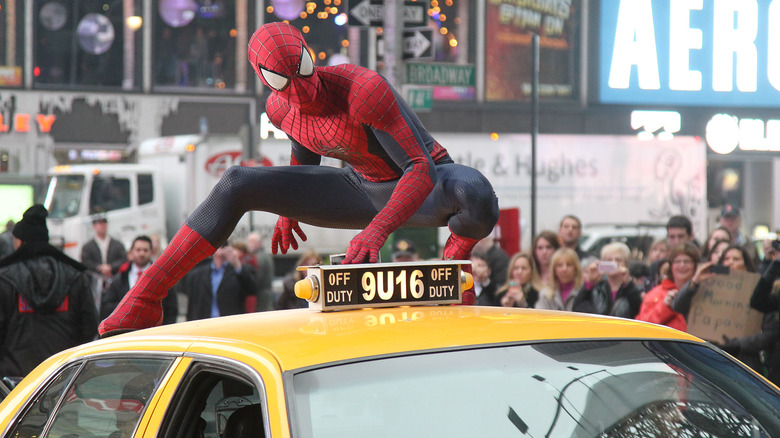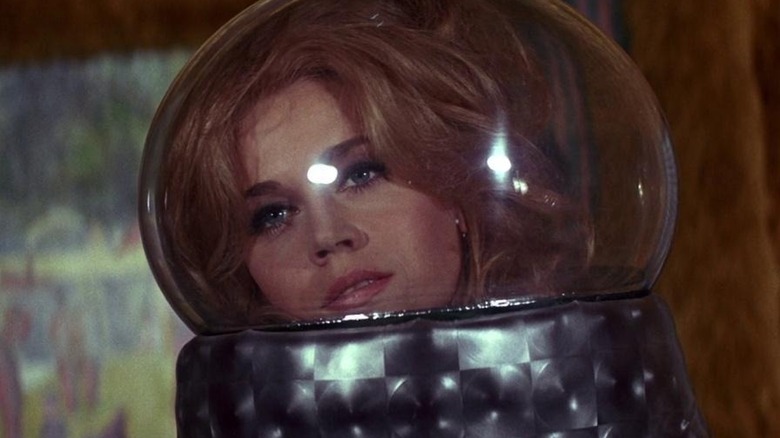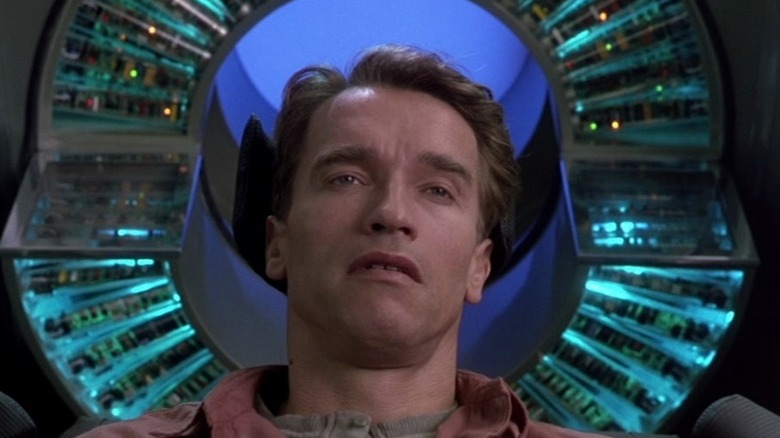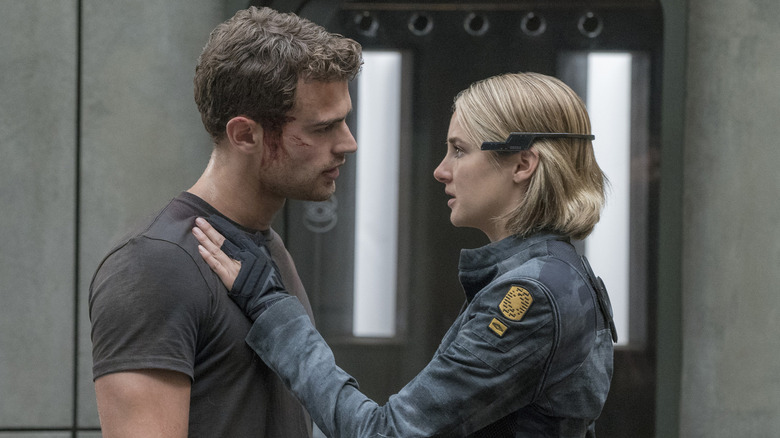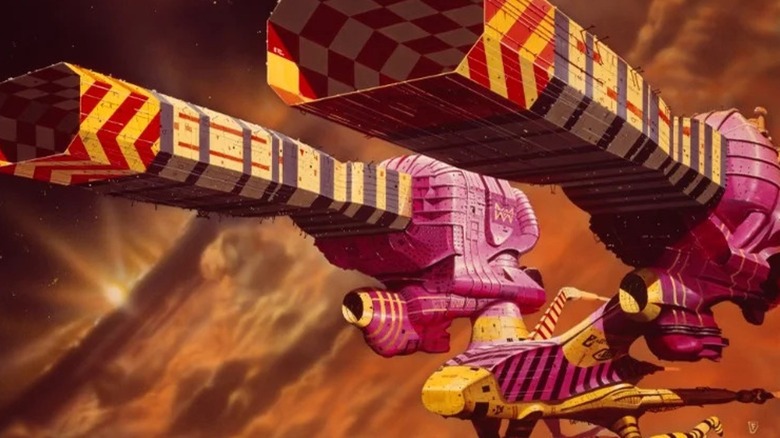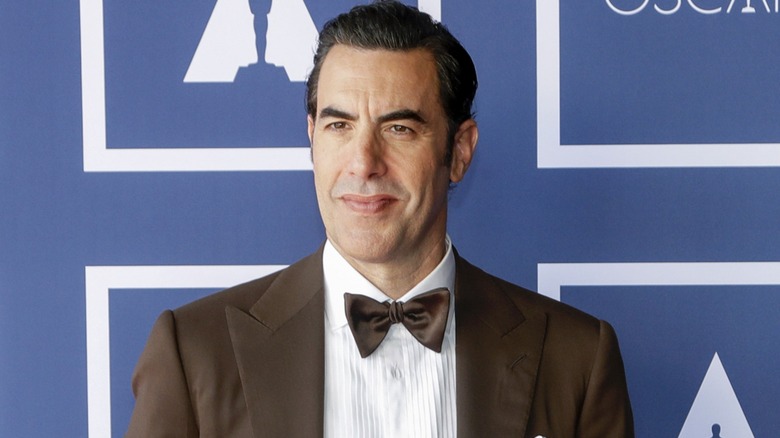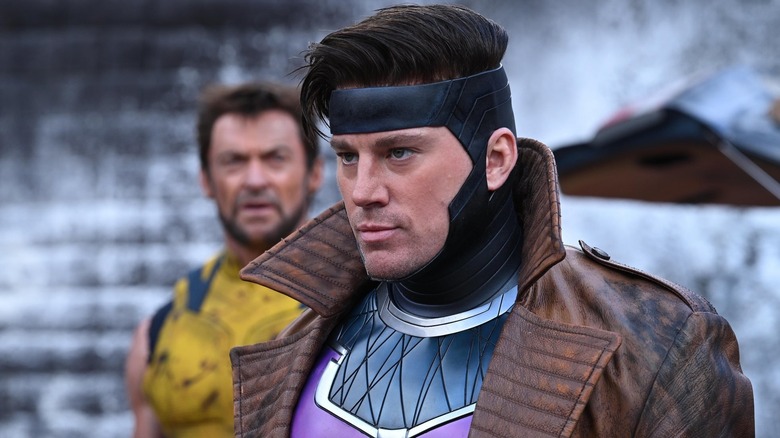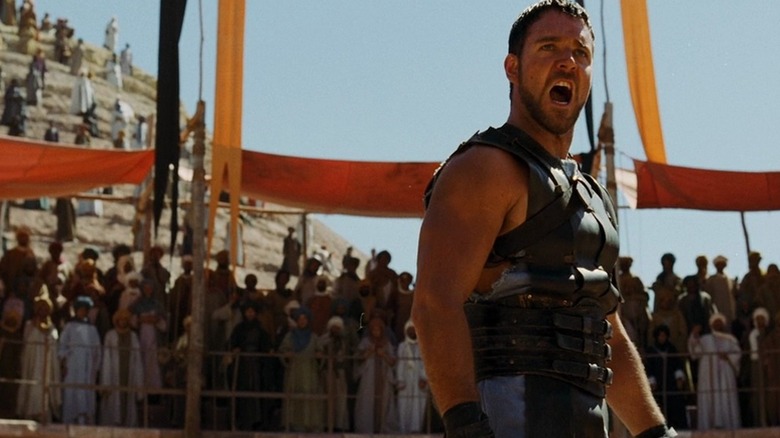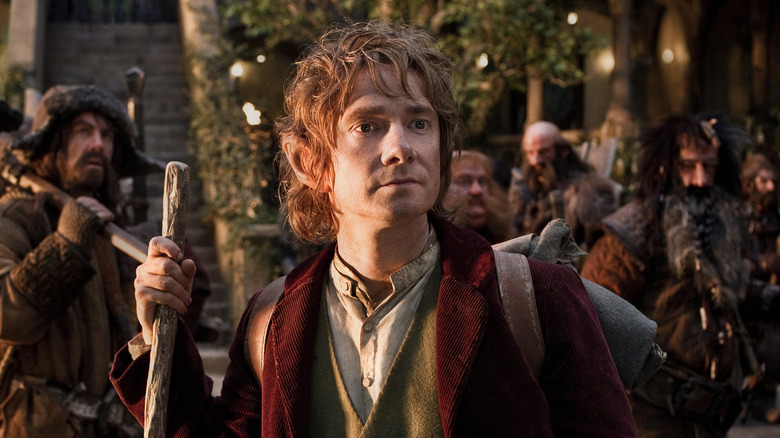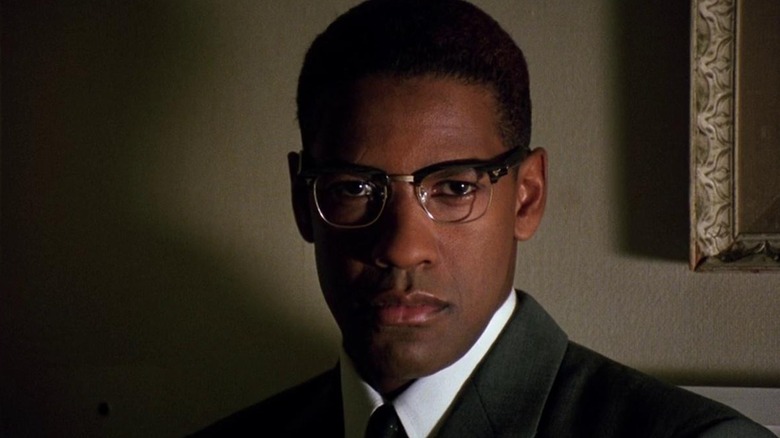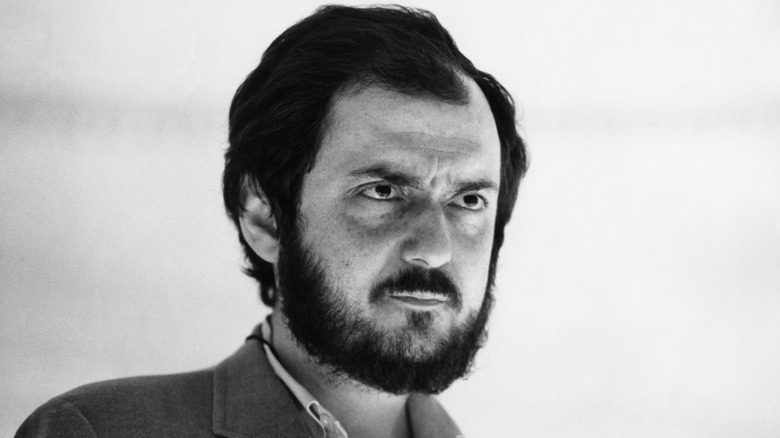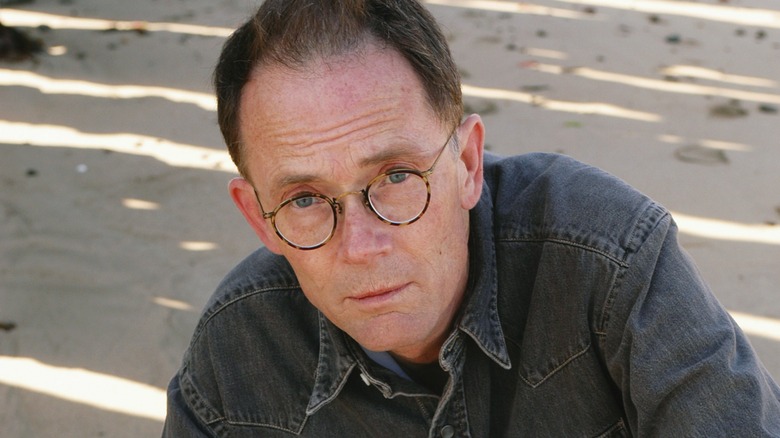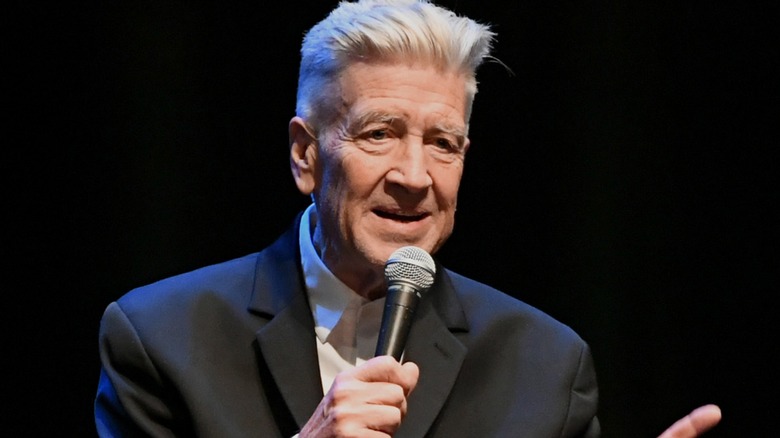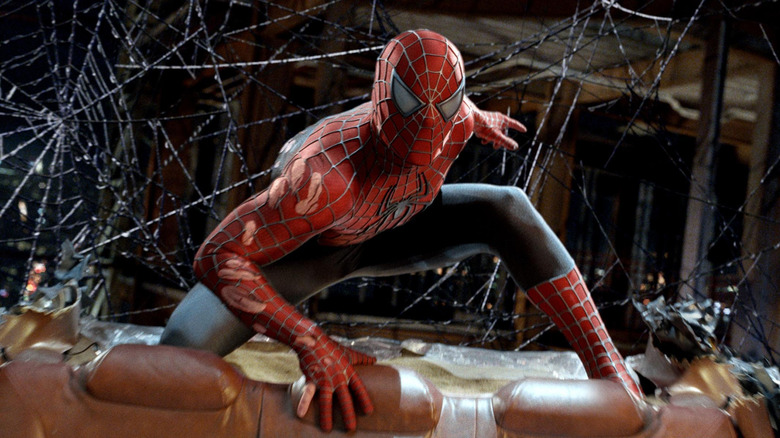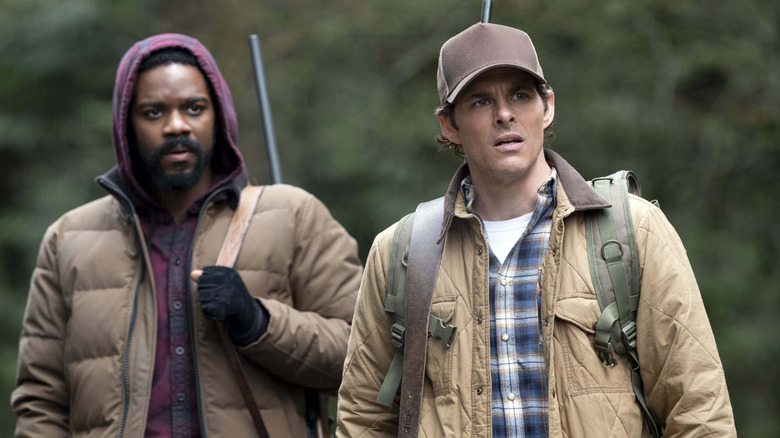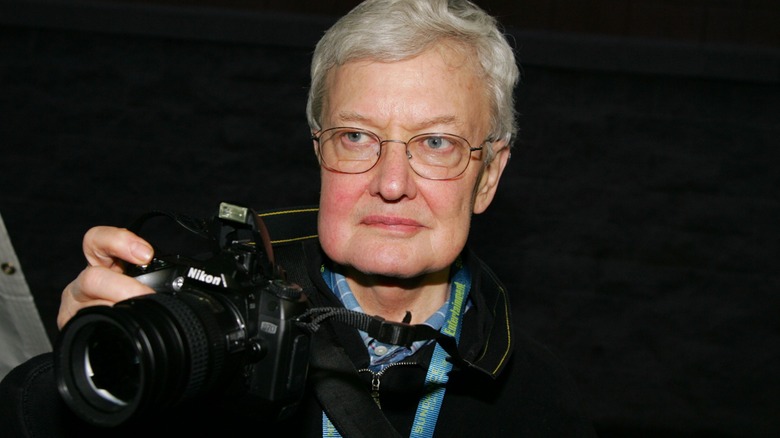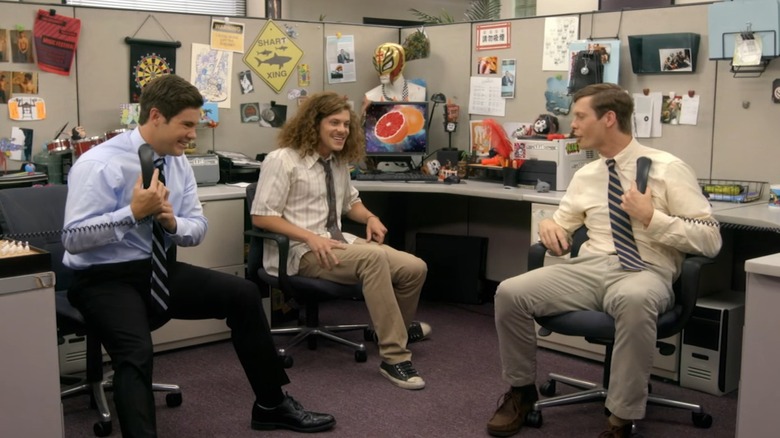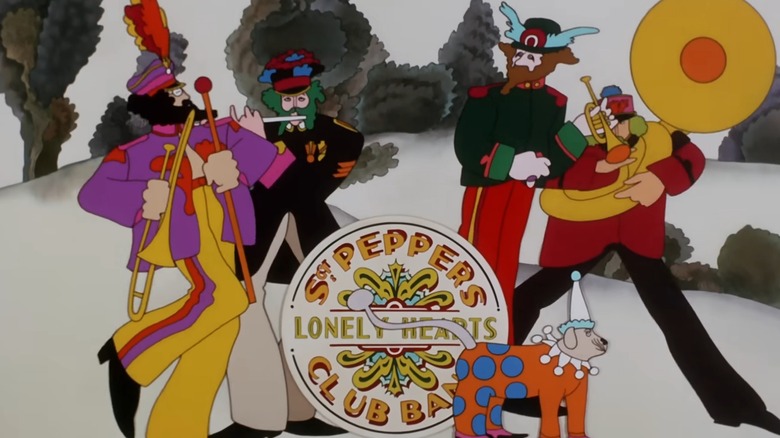Movies Canceled Because Of An Idiot Mistake
It's a miracle that any movies ever get made, let alone the dozens that Hollywood produces each year. Hundreds of people are involved, not to mention millions of dollars, dangerous equipment, and tons of other variables that can and will go wrong.
But that's just when the cameras are rolling. Sometimes, something will go so wrong on a movie that hasn't even started production yet — or has just gotten into it — that filmmakers just call the whole thing off. And it almost always comes down to some dumb thing that somebody did, like cutting the budget at the last minute or demanding unreasonable changes to the script. This is Hollywood, after all, where impulsive behavior is ingrained into the business.
These movies may have been developed with the best of intentions, and some of them may have even turned into classics, but in the end, they never saw the light of day due to poor decisions or simple human error.
At the Mountains of Madness
If anyone could make a movie out of "At the Mountains of Madness" — the novella that some consider the masterpiece of horror and science fiction author H.P. Lovecraft — it's Guillermo del Toro, the writer-director behind imaginative groundbreaking films like "Hellboy" and "Pan's Labyrinth."
"At the Mountains of Madness" was a long-simmering passion project for the filmmaker, and his plans for the movie almost found a green light at Universal Pictures. While the film, about scientists who discover ancient, terrifyingly powerful entities in Antarctica, had some similarities to "Prometheus," that's not what ultimately killed the project.
Despite James Cameron producing and interest from Tom Cruise to star, Universal balked at spending $150 million on an R-rated movie that teenagers wouldn't be able to see (and help earn back its budget). The director took the blame, saying he should have lied to executives and told them that "At the Mountains of Madness" would be PG-13 just to secure funding.
Halo
While an adaptation of Microsoft's enormously successful Xbox franchise "Halo" has since been produced as a streaming series on Paramount+, a big screen "Halo" movie never happened because of major corporate interference.
In 2005, Microsoft took the odd step of soliciting bids from studios interested in producing the "Halo" movie — but only the very biggest ones. Also not invited to contend: Columbia Pictures, as it was owned by Sony, which manufactured Xbox's competitor, the PlayStation. "28 Days Later" screenwriter Alex Garland wrote a script according to Microsoft's exacting specifications (available online), which had to be picked up from a talent agency at a specific time. Showbiz executives then had just 24 hours to read it and make Microsoft an offer.
Despite some strict stipulations from Microsoft — such as a refusal to pay for any of the film's potentially enormous production costs — Fox and Universal were the last two studios interested in making "Halo," and they decided to team up. They hired Neill Blomkamp ("District 9") to direct, but got miffed when the filmmaker had his own ideas about what kind of film "Halo" should be. Blomkamp wanted it to have a cyberpunk feel; he says executives wanted a "generic, boring film—something like 'G.I. Joe' or some crap like that." That disagreement is where the whole project, which had been tenuous from the start, started to crumble.
Star Trek: Planet of the Titans
"Star Trek" was canceled after three seasons in 1969, but its popularity exploded in syndicated reruns. Creator Gene Roddenberry was in discussions with Paramount as early as 1972 about a movie, and after a movie called "Star Trek: The God Thing" fell apart in pre-production (the plot involved the Enterprise crew squaring off against God, who was determined to destroy Earth), they got started planning a brand new "Star Trek" screenplay called "Planet of the Titans."
Roddenberry had looked at a number of story ideas and treatments and decided on one by screenwriters Chris Bryant and Alan Scott, in which the Enterprise investigates the disappearance of another ship, which leads to the disappearance of Captain Kirk and then the discovery of a planet that's home to the Titans of ancient Greek mythology. It was set to begin filming in 1977 with a budget of $10 million.
But then, just before filming was set to start, Paramount president Barry Diller called the whole thing off. Why? He thought the script was too pretentious and not very good. But according to the movie's hired director, Philip Kaufman, it was because another science fiction epic with "Star" in its title was released in 1977: "Star Wars." Reportedly, executives didn't think there were enough sci-fi fans out there to support two big space movies in the same year. Good job, guys.
Justice League: Mortal
Before the 2010s ushered in superhero universes resulting in all-star team-ups like "The Avengers" and both versions of the ill-fated "Justice League," DC Comics and Warner Bros. could have been first out of the gate with "Justice League: Mortal." In production in 2007 and planned for release in 2009, the film had George Miller of "Mad Max: Fury Road" signed on to direct. Sets were built, while the actors had been cast, fitted for costumes, and were even rehearsing. Among them: Armie Hammer as Batman, Megan Gale as Wonder Woman, Adam Brody as The Flash, Common as Green Lantern, and Jay Baruchel as villain Maxwell Lord.
The movie was budgeted at a whopping $200 million, which was supposed to be offset by shooting in Australia, which offered major tax incentives to film productions at the time. But, because getting executives to plan ahead with a $200 million budget is difficult, some tax cuts were denied to "Justice League." Lawmakers intended the provision to help smaller, independent movies, not Hollywood blockbusters, so "Justice League" resolved to film somewhere else.
But that never happened, because the script needed work and the time allotted for that ran right up against the 2007-2008 Writers Guild of America strike. By the time the strike was over and the script could be completed, many of the actors were no longer contractually obligated to stay with the film and moved on. You'd think that they would have taken steps to keep the actors around even through the strike, or at the very least, recast the whole thing. But then we wouldn't have gotten the decade of dysfunction that was the DC film universe's calling card for most of the 2010s.
Newt
In 2008, Pixar announced its slate of films for the next several years, and among them was "Newt." The plot, according to a Pixar press release at the time: "What happens when the last remaining male and female blue-footed newts on the planet are forced together by science to save the species, and they can't stand each other?" It was so far along in production that Pixar animators left little Easter eggs referencing "Newt" in "Toy Story 3" (2010) — for example, Andy has a "Newt Xing" sign on his bedroom door.
But in 2011, Fox Animation Studios released "Rio." The plot: rare exotic birds that don't get along are forced onto each other in hopes of propagating their species. In other words, it had almost the exact same plot as "Newt." Fearing "Newt" would be labeled a knockoff of "Rio," Pixar canceled its movie entirely, the only time the company has ever done that. Not that there was anything wrong with "Rio," but we probably would have rather seen "Newt." Sorry, "Rio."
A Revenge of the Nerds remake
In 2006, Fox Atomic, the 20th Century Fox subsidiary charged with making smaller and more modestly budgeted movies, began to make a modern-day reboot of the classic '80s college movie series "Revenge of the Nerds." Emory University in Atlanta agreed to have the film shoot there ... until school officials read the script and pulled out, likely due to the naughtiness that's more or less guaranteed with a comedy set in a college.
Unfortunately, a lot of the movie had already been shot, so the production crew scrambled to find a nearby college to finish the movie. The tiny Agnes Scott College in Decatur, Georgia, stepped in. But once Fox Atomic president Peter Rice saw dailies of the shoot, he wasn't happy with the small-potatoes look of the movie and shut it down completely. We'll likely never see what remains of this "Nerds" movie, which starred Efren Ramirez from "Napoleon Dynamite," among others. This idiot mistake goes to Emory for not understanding what a college comedy is before agreeing to host one. Whoever signed off on it should take a film class. Maybe just not at Emory.
Two sequels to Terminator: Salvation
In 2009, "Terminator: Salvation," the first entry in the Skynet saga since 2003's "Terminator 3: Rise of the Machines," earned $125 million at the domestic box office and $246 million internationally, thanks in part to the star power of Christian Bale as time-traveling, robot-killing, humanity-saving John Connor. A sequel was a foregone conclusion — in fact, filmmakers were planning on creating a whole new trilogy of "Terminator" movies.
Or they were, until producer The Halcyon Company went bankrupt, partially because it couldn't pay debts owed to a hedge fund called Pacificor. The true idiocy here is whatever complicated financing agreement Halcyon got itself into where $371 million in box office receipts couldn't cover the $39 million owed to Pacificor. Halcyon executives tried to salvage what they could by selling off the rights to Halcyon's properties, particularly "Terminator."
It valued those at $70 million, a number so high that at first the only major bid was made by "Avengers" director and cult TV mastermind Joss Whedon. His offer: $10,000. Several Hollywood companies then got involved in a bidding war, with the eventual winner being a company called, you guessed it, Pacificor, at a price of $29.5 million. They later sold the rights to Annapurna Pictures and Skydance Media, resulting in 2015's moderately successful "Terminator Genisys" and the outright 2019 flop, "Terminator: Dark Fate."
Midnight Rider
The reason for the cancellation of this biopic, which was supposed to star the late William Hurt as classic rock legend Gregg Allman, isn't stupid, but the behavior of the people involved sure was. ("Stupid" here means "criminally negligent.") Filming began in February 2014 with a sequence of a train going over a trestle in rural Wayne County, Georgia. A hospital bed was placed on the trestle. It wasn't the safest shooting location — the company that owned the railway had actually denied filming permission to "Midnight Rider" – and a train came down the tracks while they were filming.
High over a river, not everyone was able to get off the trestle in time. As the train hit the bed, flying debris struck camera assistant Sarah Jones. The debris knocked her into the path of the train, which struck and killed her instantly. The movie's director, Randall Miller, was found guilty of involuntary manslaughter and criminal trespassing and was sentenced to two years in prison and eight years of probation. No other scenes for the movie were ever shot.
Son of Fletch
Chevy Chase starred as smug and smarmy reporter I.M. Fletcher in "Fletch" and "Fletch Lives," both based on entries in a series of comic mystery novels by Gregory McDonald. After "Fletch Lives" was released in 1989, the franchise lay dormant until 1997, when writer-director Kevin Smith pitched Universal Pictures a third Fletch movie. Despite the title, "Son of Fletch," Smith planned for the movie to be about Fletch's daughter, played by Smith's girlfriend at the time, Joey Lauren Adams, with Jason Lee as the love interest. (Both had starred in Smith's previous films, "Mallrats" and "Chasing Amy.")
Smith wanted Chase to return and the two met to discuss the project, but Smith later claimed Chase's incessant grandstanding turned him off — and then a series of personal crises (including the end of his relationship with Adams) led him away from "Fletch" and toward "Dogma." Chase, feeling betrayed, repeatedly badmouthed Smith to the media, saying, "It's Hollywood-type crap treatment, so rude."
Fletch Won
Regardless of the way things (didn't) pan out with Chevy Chase, Kevin Smith still wanted to make some kind of "Fletch" movie. Universal's rights had lapsed, so he convinced Miramax to buy up the rights with an eye toward creating a whole new series of "Fletch" movies. This time, the idea was a reboot, or an "origin story" about young Fletch.
Once more, Smith wanted to cast his frequent collaborators, and Miramax was fine with that ... except for the lead role. Smith was adamant that Jason Lee play Fletch, but the studio insisted he wasn't a big enough star to anchor the movie. Once again, an agreement couldn't be reached and the movie fell apart. In 2014, the project was revived at Warner Bros. with Jason Sudeikis said to be in contention for the role, but that too never materialized.
In 2022, with Smith, Sudeikis, and other players long gone, Greg Mottola directed Jon Hamm as the title character in "Confess, Fletch," which was released by Miramax in limited theaters and via VOD before airing on Showtime.
Dumb and Dumber 2
A prequel to the hit 1994 comedy "Dumb and Dumber" was released in 2003, and a sequel happened in 2014, but both could have happened a whole lot earlier. In the wake of the explosive success of "South Park," co-creators Trey Parker and Matt Stone were offered all kinds of extracurricular projects. In 1998, the duo was paid $1.5 million by New Line Cinema to write a "Dumb and Dumber" prequel. But then there was no movement on the project for two years.
So what happened? Parker and Stone told Playboy in 2000 (via Vulture) that they regretted ever signing up to do it in the first place. For one, they were way too busy having to churn out dozens of episodes of "South Park" a year. They also didn't want to do a project that was somebody else's creation. In the end, Parker and Stone actually returned the money to New Line. "We felt that doing 'Dumb and Dumber' was a big step," explained Parker. "Not necessarily backward, but in a different direction, after we had worked so hard to define our style."
Uncle Tom's Fairy Tales
In 1968, around the time that he transitioned from doing safe, observational comedy to profane, honest satire about the state of race relations in the U.S., Richard Pryor wrote and starred in a movie with the intentionally controversial title "Uncle Tom's Fairy Tales." It was an extremely dark, socially conscious comedy about a rich white man put on trial by a group of militants for crimes against Black people throughout U.S. history, and featured Pryor in multiple roles.
Apparently, Pryor was so obsessed with making the movie that he neglected his wife at the time, Shelley Bonis. She reportedly confronted him about it, and Pryor shredded the only working print of the not-quite-finished movie during the argument just to spite his wife. The unfinished film was considered lost for more than 30 years, until clips showed up in a Directors Guild of America tribute to Pryor in 2005. In seems that "Uncle Tom's Fairy Tales" director Penelope Spheeris (who later directed "Wayne's World") had another partial print, but a stalled lawsuit — initiated by Pryor himself before his 2005 death — is trying to keep it from ever becoming public.
Pyongyang
Based on Guy Delisle's intense graphic novel of the same name, "Pyongyang" was supposed to start shooting in early 2015. Delisle actually spent two months living and working in Pyongyang, the capital city of North Korea, and the book details his struggles of living under totalitarianism. "Pirates of the Caribbean" director Gore Verbinski had signed on to direct, and Steve Carell was set to star.
But after Sony Pictures pulled the North Korea-skewering Seth Rogen comedy "The Interview" in 2014 after bomb threats were directed to American theaters playing it, New Regency Films canceled "Pyongyang" before it even started filming. This rather short-sighted mistake is down to Sony for making "The Interview" and then letting their emails get hacked and starting the entire hullabaloo about releasing it. Oh, and "The Interview" wasn't even a good flick, so we got stiffed out of "Pyongyang" and don't even have much to show for it.
The Adventures of Fartman
In his memoir "Private Parts," radio host Howard Stern recalls creating a mock superhero character called Fartman in 1981, when he was scheduled to interview TV's Batman, Adam West. His "powers"? High-powered flatulence and the ability to fly ... via flatulence. Stern started performing the character regularly on his radio show in the early '90s, and famously appeared as Fartman live at the 1992 MTV Video Music Awards dressed in a superhero costume ... and giant rubber butt cheeks. which expelled huge amounts of smoke-like farts. Comedy!
Stern was so popular that New Line Cinema started production on "The Adventures of Fartman," even hiring J.F. Lawton ("Pretty Woman") to write and direct it. He promised plenty of nudity, crudity, romance scenes, bad language, and farting. In other words, exactly what one would expect from a Howard Stern movie. New Line, however, didn't quite get what they'd signed up for, as an executive asked Lawton if he could somehow try and make "The Adventures of Fartman" a more commercially viable PG-13 movie rather than the hard R it was clearly going to be. When Stern got wind of that, he was incensed and pulled out of the movie.
A Lord of the Rings adaptation in the 1960s
J.R.R. Tolkien's "The Lord of the Rings" ranks among the most beloved best-selling novels of all time. First published as three separate volumes in 1954, it took until 2001 for an epic, live-action adaptation to hit movie theaters, directed by Peter Jackson. It's crazy that it took so long — but it wasn't for a lack of trying.
Shortly after Tolkien sold the film rights to the books to United Artists in the 1960s, the Beatles expressed interest in making the movies. Along with plans for recording an original, double-album soundtrack, the Fab Four would have starred, too. Paul McCartney once told Peter Jackson that he would have played Frodo, John Lennon would have been Gollum, George Harrison was going to be Gandalf, and Ringo Starr was set to play Samwise Gamgee. Representatives of the band wanted no one less than Stanley Kubrick to direct. That's when the plans fell apart — Kubrick said films made out of Tolkien's books were "unmakeable."
Alien: Awakening
Like any other franchise, the "Alien" series has had its fair share of ups and downs. Ridley Scott kicked the series off with the original 1979 film, but the franchise arguably peaked in the '80s when James Cameron stepped in to direct the sequel, "Aliens." More sequels and spin-offs kept popping up for years, but in 2012 Scott was back in the director's chair, intending to create a prequel trilogy.
"Alien: Awakening" would have marked the end of Scott's prequel story, but apparently it was never meant to be. Ultimately, there may have been a problem with making the prequel into a trilogy in the first place. Audiences were a bit frustrated with "Prometheus," the first prequel film, because it raised so many questions about the "Alien" universe without coming close to answering any of them. The next film, "Alien: Covenant," still didn't provide any satisfying answers and suffered a lackluster performance at the box office.
It didn't help matters that Scott made some confusing remarks about the trajectory of the franchise. In some interviews he insisted that six more movies could follow "Covenant." In others he suggested that "Awakening" would take place between "Prometheus" and "Covenant." Audiences didn't get excited for the stretched-out, confusing prequel series, so "Awakening" didn't see the light of day.
The Aristocats 2
A majority of canceled movies fizzle away without leaving much of a lasting legacy. Disney stopped work on "The Aristocats 2" before it ever had a hope of coming out and making a cultural impact, but the would-be animated feature still possibly had an influence on other Disney animation projects — unfortunately, the impact it had probably wasn't what the artists working on it wanted.
According to animator Tod Carter, "The Aristocats 2" was surprisingly far in development when it got canceled. The film had already gone through multiple scripts by the time the animators got to work. The producers wanted to start getting real work done, so Carter and the other artists came up with a solution. By adjusting their usual process, the artists were able to finish a rough story reel for the entire film in just five weeks.
That wasn't enough to save the movie. At the time Disney was shifting its strategy away from making sequels. The studio pulled the plug on the movie at the last minute, but all the work on the story reel had unintended consequences. "The bad news was that we had established a precedent of what can be accomplished in that time frame," Carter joked to Animated Views, adding, "and the producers and budgeters at Disney had taken notice."
The Amazing Spider-Man 3
It's hard to really pin the cancellation of a movie on one specific mistake. More often than not, a variety of factors influence whether or not a movie gets made. But eventually there's a straw that breaks the camel's back, forcing someone to make a decision one way or another. That appears to be what happened with "The Amazing Spider-Man 3."
Andrew Garfield first donned the red and blue suit in 2012's "The Amazing Spider-Man." That movie more or less successfully kicked off a rebooted "Spider-Man" franchise, but trouble was just around the corner. "The Amazing Spider-Man 2" fell flat with critics and didn't make as much money as its predecessor at the box office.
Sony, the studio behind the franchise, clearly had worries coming out of the sequel, but then a mistake from Garfield put the nail in the series's coffin. In 2014 Sony hosted a massive event in Rio de Janeiro, and Garfield was supposed to show up to help the studio officially announce the release date for "The Amazing Spider-Man 3." At the last minute, Garfield decided not to attend. A year later when Sony's servers were hacked, fans learned that Garfield had reportedly been fired after failing to show up for the announcement. Sony took Spider-Man in a different direction, and fans didn't see Garfield as Spidey again until the multiversal madness of Marvel's "Spider-Man: No Way Home."
Barbarella
The original "Barbarella" comic was written by Jean-Claude Forest and published in the 1960s. Telling the scandalous stories of the titular space explorer, "Barbarella" instantly found fans that would stick with the character for decades. A film adaptation came along in 1968, and thanks in large part to an excellent performance by Jane Fonda, was a critical success. The film wasn't enough of a hit to spawn a whole "Barbarella" movie franchise, but it was always going to be a matter of time before someone attempted a remake.
We almost got to see a version of the character brought to life by Robert Rodriguez. Hot on the heels of Rodriguez's success adapting "Sin City" into a feature film, he was offered a chance to repeat his success with Forest's source material. But Rodriguez turned down a $70 million budget for "Barbarella" because of one terrible mistake made by the producers. A German company was financing most of the film, but as a condition for getting the money, the entire movie had to be shot in Germany. Rodriguez, a father of five, balked at the idea of being away from his family for months on end. He declined the project, and the "Barbarella" reboot died shortly thereafter.
Batgirl
iMovies tend to get canceled before they get made. If you've already spent the money making a movie, why would you refuse to release it? It takes some seriously misguided ingenuity to find a way to make money off a movie without releasing it, but somehow Warner Bros. managed to find a way to do it.
Warner Bros. made a "Batgirl" movie as part of the DCEU, and the studio gave the film everything it needed to succeed. "Batgirl" had a $90 million budget, plus stars like Leslie Grace, J.K. Simmons, Michael Keaton, and Brendan Fraser. The movie was directed by Adil El Arbi and Bilall Fallah, and it was just about ready to go when Warner Bros. pulled the plug. The studio released a statement that said, "The decision to not release 'Batgirl' reflects our leadership's strategic shift as it relates to the DC universe and HBO Max."
There were conflicting opinions on why the movie got canceled. DC Studios CEO Peter Safran told Deadline, "There are a lot of incredibly talented people in front of and behind the camera in that film, but ['Batgirl'] was not releasable." Others noted that by refusing to make any money from the movie, Warner Bros. would be able to use the budget as a hefty tax write-off. Whatever the reason, not believing in "Batgirl" was definitely a mistake.
Boba Fett
The Disney era of "Star Wars" has brought an explosion of content for fans to dive into. From animated shows to spin-off movies, it seems like Disney isn't holding back any ideas for new "Star Wars" stories. But there have actually been some canceled projects. Back when spin-offs like "Rogue One" and "Solo: A Star Wars Story" were still in development, Disney also had plans for a Boba Fett movie that would bring a whole new dimension to the character.
Josh Trank was recruited to directed the movie, but mistakes he made on the set of another film killed the project before it ever really began. Trank broke out with 2012's "Chronicle," a creative approach to the superhero genre that landed him a job directing the "Fantastic Four" reboot. While working on that movie, Trank was staying in a rental house, and his dogs reportedly caused around $100,000 worth of damage to the property. That, combined with rumors that Trank was difficult to work with, raised big red flags for Disney, and it pivoted away from its plans for a Boba Fett movie. For better or worse, fans of the most famous bounty hunter in the galaxy got "The Book of Boba Fett" series on Disney+ instead.
Crusade
Arnold Schwarzenegger was already one of the biggest action stars around when he partnered with director Paul Verhoeven to create the schlocky sci-fi classic "Total Recall." From there the two went on to make other massive hits. Schwarzenegger starred in "Terminator 2: Judgment Day," while Verhoeven directed "Basic Instinct." They each had their own industry success stories, but shortly after the release of "Basic Instinct," Verhoeven sank a film that could have changed both of their careers forever.
Schwarzenegger and Verhoeven were set to reunite for another massive action epic. Titled "Crusade," the movie would have been set in the Middle Ages and followed Schwarzenegger's character Hagen as he transformed from a lowly thief to a holy crusader who eventually turns on Christianity. "Crusade" had everything it needed to succeed, including a script by Walon Green, the screenwriter behind "The Wild Bunch." Then Verhoeven killed the project in one fell swoop.
When Schwarzenegger and Verhoeven met with executives to try and secure funding for the movie, the potential backers wanted Verhoeven to guarantee that the project wouldn't go over its $100 million budget. Apparently the mere suggestion that Verhoeven could guarantee anything enraged the director. He went off on a tirade about the unexpected complications that arise in filmmaking and the unpredictability of life itself. It was too much for the potential producers. They backed out of the movie, and now "Crusade" is just a Hollywood legend.
Divergent: Ascendant
"If your friends jumped off a bridge, would you do it, too?" We all heard that refrain as children, and the point is that you don't always have to go along with what everyone else is doing. Sometimes it's better to trust your gut and go your own way. Apparently that's a lesson movie studios still need to learn.
The "Divergent" series came at the tail end of the young adult book-to-movie trend. It followed successful series like "Harry Potter," "Twilight," and "The Hunger Games," but it might have taken the wrong lesson from those movies. The "Harry Potter" adaptation split the final book into two movies, and pretty soon everyone else was following suit. It worked better in some cases than others, but for "Divergent," following the trend backfired completely.
It didn't necessarily make sense story-wise for the last "Divergent" novel to be split into two movies, but Lionsgate went ahead with it anyway. Then the third movie, "Allegiant," flopped financially and critically at the box office, and the studio tried to change its plans at the last minute. Lionsgate cut the budget for the fourth film, "Ascendant," deciding to release it as a TV movie. The stars pushed back, and eventually "Ascendant" went nowhere at all.
Dune
"Haven't there been a zillion "Dune" adaptations?" asks the uninitiated. There have been three, to be precise, but longtime "Dune" fans know that the wildest version of Frank Herbert's universe on the big screen never became a reality. In the 1970s, famed director Alejandro Jodorowsky had a bizarre vision for "Dune," and today his adaptation is considered one of the greatest films never made.
Jodorowsky made many mistakes while trying to adapt "Dune," the first of which was not actually reading the novel that Herbert wrote. But his biggest mistake, and the one that killed the project, was refusing to put any restrictions on his extremely ambitious ideas. Jodorowsky planned a "Dune" film that would alter the minds of all its viewers and be hailed as a spiritual experience that changed film history, and world history, forever.
To achieve his dream movie, Jodorowsky had a few entirely unreasonable requirements. He wanted $15 million to create expansive sets, develop an Earth-shattering soundtrack, and make Salvador Dali do one hour of work as the highest paid actor in history. He also demanded that the movie be allowed to stretch to the 10- or 12-hour mark, something that would have pushed the physical limitations of film at the time just as much as the audience's patience. Plenty of work on the movie got done, but in the end Jodorowsky couldn't find enough money to see the project to completion.
Freddie Mercury biopic
2018's "Bohemian Rhapsody" starred Rami Malek as Freddie Mercury and won four Oscars for telling the story of Queen. The movie was a stunning success, but it almost never existed. In another timeline, a biopic dedicated to Mercury's story was created by Sacha Baron Cohen. As far back as 2010, Cohen was in talks to make a movie about Queen, but he ran into some serious resistance from, well, Queen.
Despite his excitement about the project, just a few years later Cohen walked away from the movie. Cohen explained at the time that he and the members of the band couldn't reconcile their different visions for the film. The band wanted to create a movie that focused on how all of them recovered from Mercury's death, which they imagined would happen about halfway through the film. Cohen was much more interested in focusing on Mercury himself and dedicating plenty of screentime to some of the singer's wildest rock 'n' roll stories.
The disagreement got heated enough that some Queen members still have negative feelings about Cohen. "I think [Cohen's movie] would have been utter s***," drummer Roger Taylor told Metro in 2021. "Sacha is pushy, if nothing else." Cohen's complete refusal to compromise with the band might have cost him a movie, but judging by the reception of "Bohemian Rhapsody," no one's going to complain about that.
Gambit
There has been an endless stream of "X-Men" movies since the early 2000s, but the movies have still barely scratched the surface of the comic series's lore. There are enough characters in the "X-Men" comics to support dozens of standalone films, and for a moment it seemed like that's what we were going to get. 2009's "X-Men Origins: Wolverine" seemed ready to kick off a slew of spin-offs, but that movie's spectacular failure isn't what finally killed another "X-Men" standalone.
Gambit is a beloved "X-Men" character who grew up in New Orleans and developed the ability to charge objects — usually playing cards — with explosive energy. Taylor Kitsch briefly brought the character to life in "X-Men Origins," but that film's poor reception delayed Gambit's solo outing. Eventually Channing Tatum got involved in the project, first as a star then as a potential director, and "Gambit" started to seem like a real possibility.
Then Fox made a fatal error. After the 2015 "Fantastic Four" reboot flopped, Fox slimmed down the budget on "Gambit," even though the character belonged to a different comic book property entirely. The change slowed production down just enough that the movie couldn't come together before Disney swooped in and bought Fox — effectively wiping the original "X-Men" movie continuity, and "Gambit" with it, off the board.
Thankfully, we got to see Tatum as Gambit in 2024's "Deadpool & Wolverine," and the overwhelming positive response to the character's appearance might mean good things for the future.
Gladiator 2
Being successful in one area of life doesn't necessarily make it easier to succeed in others. It's a logical fallacy that, in the mid-2000s, led to a whole movie being scrapped. After the massive success of "Gladiator" in 2000, director Ridley Scott and star Russell Crowe were both interested in a sequel. The two of them needed someone who could write a screenplay that was just as good as the original and that could somehow work around the fact that Crowe's character had died. So they turned to Nick Cave, frontman of the Bad Seeds.
Writing "Gladiator 2" would have been a monumental task for anyone, but Cave didn't really have any experience as a screenwriter at the time. Being able to turn out incredible songs doesn't necessarily translate to being able to turn out a great script. Cave told Collider that after sending his finished screenplay to Crowe, he received a simple message in response: "Don't like it mate." Luckily, Cave enjoyed working on the script anyway.
Years later, a new version of "Gladiator 2" was brought to life, only without Crowe and with screenwriter David Scarpa given the unenviable task of finding a good way to follow up the original. "Gladiator II" stars Paul Mescal, Denzel Washington, Pedro Pascal, and Connie Nielsen.
The Hobbit
If "The Hobbit" trilogy left a bad taste in your mouth, it might be better to pretend that a previously canceled version never existed in the first place. There was a not-so-brief moment in the mid-2000s where it looked like J.R.R. Tolkien's beloved novel would get an adaptation produced by Peter Jackson and directed by Guillermo del Toro. The project was announced several years after the conclusion of "The Lord of the Rings" trilogy, and del Toro signed on right away. The director was just coming off "Pan's Labyrinth" and "Hellboy," so fans were particularly excited to see what kind of visual style del Toro could bring to Middle-earth.
The first hiccup in the project had to do with the rights to the story. MGM owned "The Hobbit," but New Line Cinema had produced "The Lord of the Rings" movies. After that issue was settled, it looked like del Toro's "The Hobbit" would be able to hit theaters in the 2010s, but the path forward wasn't so easy. New Line Cinema was struggling financially, so it held off on putting "The Hobbit" into full production. Eventually del Toro got sick of waiting and moved on to do other things. It may have just been a case of bad timing, but if New Line had acted faster on the project, we all would have seen del Toro's vision of Middle-earth for ourselves.
Malcolm X
The late 1960s gave us one of the most cringe-inducing moviemaking mistakes of all time — though calling it a mistake is probably being a bit generous. Columbia Pictures planned to make a film about Malcolm X after acquiring the rights to "The Autobiography of Malcolm X" by Alex Haley. In 1968, the studio had seemingly found its screenwriter, and James Baldwin moved out to Los Angeles to start working on the project.
When you've got one of the greatest writers in American history working on a film about one of the most influential civil rights leaders of all time, you should probably stay out of his way. Naturally, the studio didn't. Baldwin's vision for the film wasn't the sanitized story that executives wanted. Even worse than that disagreement, though, was that someone suggested that Charlton Heston play Malcolm in blackface.
In the end, Baldwin finished his script, which was sold to Warner Brothers and never shown to the public. Decades later, when Spike Lee set his sights on telling Malcolm's story, he tracked down Baldwin's script and used it as inspiration. So even though Baldwin's movie got canceled, part of it lives on in 1992's "Malcolm X."
Napoleon
Stanley Kubrick has said that he came up with the idea for his greatest movie during the production of "2001: A Space Odyssey." Kubrick's sci-fi masterpiece was barely out the door, and he was sinking into research on Napoleon Bonaparte, in preparation of making a massive historical film covering the entire life of France's most notorious leader. Kubrick wrote a 148-page screenplay and took intricate notes on Napoleon's life and the minute historical details of his time. But all that work wasn't enough. When Kubrick took his ideas to MGM, the studio that had financed "2001," he got turned down.
The studio didn't believe that Kubrick's historical drama would find an audience, but judging by the legacy that just the idea of "Napoleon" has left, it couldn't have been more wrong. Despite only being in the earliest stages of production, Kubrick's "Napoleon" is a regular competitor for the title of best movie never made. "Napoleon" has plagued the imaginations of film buffs for decades, but it might be coming a little closer to reality in the near future. Steven Spielberg announced plans to adapt Kubrick's massive screenplay into a seven-part series for HBO, although it's not clear whether that project has been supplanted by Ridley Scott's big-screen 2023 epic, "Napoleon."
Neuromancer
Cyberpunk has been all the rage for quite some time. Movies like "The Matrix" brought the genre into the mainstream in the late '90s, and today IP like "Cyberpunk 2077" is keeping it alive. The genre started long before either of those franchises existed, and it was originally popularized in 1984 by a sci-fi author named William Gibson and a novel called "Neuromancer." The novel is set in a high-tech, low-life future and tells a fairly straightforward heist story — albeit one filled with computer hackers and artificial intelligences.
"Neuromancer" has always been ripe for adaptation, but somehow a movie has never managed to coalesce. Fans were closest to seeing "Neuromancer" on the big screen in the early 2010s. Vincenzo Natali signed on to direct the film, with Gibson's blessing. Three years later the movie still wasn't in production, with Natali telling CraveOnline, "The script has been ready for years. That's not the holdup. The challenging part of this is putting the money together."
Even with a celebrated sci-fi director and a finished script, the movie languished for years. No one prioritized adapting one of the most popular sci-fi novels of all time, and by the time some new financiers got on board in 2015, they had to start the search for a script and director all over again because Natali had left the project behind.
Ronnie Rocket
"Ronnie Rocket" is the original movie that David Lynch never got to make. The visionary director had an idea for a movie about electricity, detectives, and three-foot-tall rock stars. "Ronnie Rocket" sounds as wonderfully bizarre and imaginative as anything else that Lynch has created, and we owe its absence from our collective imaginations to two different errors.
The first happened a long time ago. Lynch had just come up with the idea for a new, deeply strange movie. He was already known for making 1977's "Eraserhead," but without the benefit of a lengthy career to back him up, Lynch had a hard time selling his new idea to studios. He decided to put the project on the back burner and let life go on. Studios not believing in weird movies is something of a constant mistake in Hollywood, but "Ronnie Rocket" might have had one more shot at life were it not for Lynch himself.
In a 2013 interview with Bomb, Lynch talked about why "Ronnie Rocket" couldn't work anymore, even though he had the resources to get the movie made. He pinned the blame on an odd culprit. "Graffiti kills the possibility to go back in time and have the buildings be as they were," Lynch said. Because of graffiti, Lynch believed that he couldn't recreate the industrial smokestack aesthetic he needed for the film to work.
Spider-Man 4
In the "Spider-Man" comics, the Parker curse continually brings Peter misery and bad luck. In the real world, a different kind of curse seems to affect "Spider-Man" movie franchises. Sony's original "Spider-Man" trilogy is still a celebrated milestone in the world of superhero movies, but it ended at least one movie earlier than it was supposed to.
"Spider-Man 4" is one of those tantalizing "what if?" stories. The movie would have continued from where "Spider-Man 3" left off, introducing some classic comic book characters like Black Cat and the Vulture along the way. Unfortunately, Sony refused to give Sam Raimi the time he needed to make the movie great.
The studio wanted "Spider-Man 4" to be released in May 2011, but the process of writing the script dragged on longer than expected. After numerous rewrites, Raimi still wasn't happy with what he had, and he told the studio that the release date would need to be moved. Sony pushed back on that, and eventually Raimi left the project altogether, leaving Sony to reboot the franchise. Ironically, the first movie in the relaunched series, "The Amazing Spider-Man," didn't debut until July 2012, so Sony missed its deadline anyway.
The Stand
Novel adaptations are particularly hard to crack. Everyone has their own priorities and their own ideas about what will satisfy established fans while also bringing in new moviegoers. Somehow, producers, directors, screenwriters, and authors need to find a way to balance their expectations and cooperate with each other. Any refusal to compromise is sure to sink a movie, and that's exactly what happened with Stephen King's "The Stand."
King first published his post-apocalyptic epic in 1978. Like so many of his other stories, "The Stand" was instantly begging for some kind of adaptation. For a brief moment, it looked like another horror master would help bring King's story to a new audience. "Night of the Living Dead" director George A. Romero told SciFiNow that working on "The Stand" was one of his biggest frustrations as a director.
According to Romero, he and King butted heads because the author refused to let "The Stand" be adapted as a TV series and instead thought it should be a three-hour movie. "At that time Steve was very insistent about getting his own way and if he couldn't get his way he would just pull the plug and say, 'Forget about it,'" Romero recalled. The two never found funding for their movie, but years later "The Stand" was adapted into not one, but two different TV miniseries.
Who Killed Bambi?
Some of the canceled movies on this list might have turned out to be masterpieces. Others are probably better off for having never been made. There's one, though, that would have been undeniably worth watching, and that's the Sex Pistols movie written by Roger Ebert. That may sound like the description of a fever dream, but the movie very nearly got made, and it was called "Who Killed Bambi?"
Well, eventually that was the title. When Ebert first wrote the screenplay in 1977, it was called "Anarchy in the U.K." Ebert himself suggested the title change, which director Russ Meyer and producer Malcolm McLaren quickly greenlit. The punk rock movie probably wouldn't have gone down as one of the greatest movies of all time, but as an artifact of rock history, it would have been priceless.
There are multiple reasons why "Who Killed Bambi?" never got made, not the least of which is that making a feature film isn't very punk rock. The Sex Pistols were always anti-establishment, but that's a hard stance to maintain in the movie business. The mistake that ultimately killed the film, though, belongs to McLaren. He planned to get the film released a year after the screenplay was written, which was overly ambitious, and along the way he forgot to actually get the money for the movie. McLaren didn't pay some of the crew, so they walked out, killing the movie just a few days after it started shooting.
Workaholics
Anyone who tuned into Comedy Central at any point in the 2010s is at least a bit familiar with "Workaholics." The series starred creators Blake Anderson, Adam Devine, and Anders Holm as a trio of friends who spend their days working in telemarketing and their nights pursuing various schemes in their shared home. The show ran for seven seasons between 2011 and 2017, but fans were always hungry for more.
In 2021 it looked like fans were going to get what they wanted. Comedy Central announced plans for a "Workaholics" movie that would stream on Paramount+ sometime in the near future. The movie would focus on the gang getting up to their usual shenanigans, but this time through the lens of work and life during the pandemic. Then, just as work on the film was about to really get underway, the streamer pulled the plug.
Paramount+ stated that the movie didn't fit into its content strategy moving forward, but at the same time the platform refused to relinquish the rights to "Workaholics." Speaking with Cinemablend, series star and co-creator Devine explained that he thought Paramount+ was worried about the possibility of selling off the movie, only for it to become a huge success on another platform. "You know," he said, "no one wants to look like bozos." As long as the platform is sitting on the fence, the "Workaholics" movie is dead in the water.
Yellow Submarine
When Beatlemania rocked the world, the band was able to pursue all kinds of projects that might seem strange in retrospect. One such side hustle was the 1968 movie "Yellow Submarine," which has become something of an animated classic. The film is full of stunning cartoon work and plenty of musical numbers, and it's really a one-of-a-kind movie that could never be recreated.
That hasn't stopped some people from trying. At the 2009 D23 Expo, Disney announced that it would remake "Yellow Submarine" with the help of director Robert Zemeckis and his ImageMovers studio. The idea of remaking the movie was arguably a mistake in the first place, especially considering how expensive the rights to The Beatles's music were going to be, but that's not where it ended. The rebooted "Yellow Submarine" would have gone for a darker tone, playing up the Blue Meanies and Pepperland to be more gritty and scary than they were in the '60s.
That darker tone would have been paired with some deep uncanny valley feelings, as ImageMovers would have used burgeoning motion capture technology to make the film's animation a bit more realistic. None of that sounds like anything Beatles fans would want. Luckily, Disney realized its mistake before the movie got too far along, and we were all saved from seeing a nightmarish animated Beatles movie.
